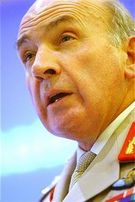 So, General Dannatt is to be a Tory Peer. This worries me greatly. On balance, General Dannatt did a good job as Army chief. Not a great job, but a good one. His interventions boosted the morale of frontline troops and his concern for the care of soldiers, especially the wounded, was important. Conversely, many defense analysts thought he was too cautious on military reform, blocking the Army’s transformation into an effective counter-insurgency force and opposing stop gap procurement in case it compromised future acquisition projects. But the real concerns over General Dannatt’s ennoblement are different.
So, General Dannatt is to be a Tory Peer. This worries me greatly. On balance, General Dannatt did a good job as Army chief. Not a great job, but a good one. His interventions boosted the morale of frontline troops and his concern for the care of soldiers, especially the wounded, was important. Conversely, many defense analysts thought he was too cautious on military reform, blocking the Army’s transformation into an effective counter-insurgency force and opposing stop gap procurement in case it compromised future acquisition projects. But the real concerns over General Dannatt’s ennoblement are different.
General Dannatt should have given his sucecssor a clear run at the job. He should have had the decency showed him by his predecessor, Mike Jackson. By taking a Tory peerage, he has set a dangerous precedent for future Army chiefs. What government will trust that military advice is impartial if it becomes normal practice to take party political affiliation upon retirement? Before anyone mentions Lord West, there is daylight between the former Navy chief’s non-military remit as a Security Minister and what is likely to be a Defence brief for General Lord Dannatt’s.
Second, General Dannatt may have been right on Afghanistan, but he was wrong, very wrong, on Basra. In October 2006 he told Sarah Sands that Britain’s presence in Basra was the problem, and that forces should withdraw: a view that paved the way for the British drawn-down and the vile deal with Shia militias. Iraqi Prime Minister Nouri al-Maliki and General David Petraeus showed this policy to be wrong, both morally and practically, when they re-took the city in the “Charge of the Knights”. While Dannatt is the press’ darling now, he can exhibit appalling misjudgement and a willingness to base his position not on a serious assessment of the situation on the ground, but on concern with preserving the Army’s “honour”.
Most troubling of all is General Dannatt’s desire to infuse his strongly-held Christian faith, quite publicly, into public policy. Our ability to deal with what Julian Lewis calls un-Islamic terrorism is predicated on the refusal to portray the struggle in religious terms, so as not to give succour to the “Clash of Civilizations” rhetoric that Osama Bin Laden perpetuates. I take no issue with anyone’s faith, but am concerned that Lord General Dannat will struggle to tow this line.






Comments